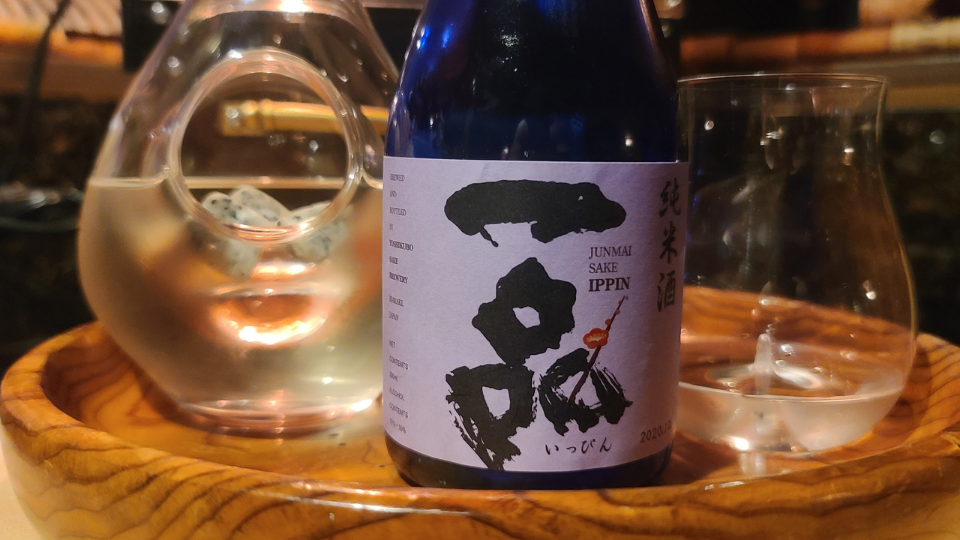Sake brewer Niida Honke in Kōriyama, Fukushima Prefecture, has been in business for over 300 years. Known for its unwavering commitment to natural ingredients and traditional methods, it attracts a steadfast following of devotees to its various labels. The brewery struggled in the wake of the Fukushima Daiichi disaster. But instead of giving up, it expanded its product line to include sweets made with kōji, the same natural yeast that is used to make sake.
At the entrance to brewery Niida Honke on the outskirts of Kōriyama in Fukushima Prefecture stand three large sake barrels, each embellished with a kanji character that together spell out “shizenshu,” meaning “natural sake,” the brewery’s flagship label. The brand name epitomizes Niida Honke’s unique approach to sake-making. Located in the rustic Kanezawa district, the brewery holds to the principle that “sake is good for the body” and uses only organic rice, fresh spring and well water, and natural yeast from its own brewery.
Founded in 1711, the brewery has remained in the same location for more than 300 years, a feat Niida Yasuhiko, the eighteenth-generation head of the company and its tōji master brewer, attributes to the local climate being perfectly suited for sake making. “My job is to make sure we pass on to future generations not only our sake brands,” says Niida, “but also our rice paddies, mountains, and water.” To that end, the brewery has plans to use only sake rice cultivated in its own rice fields. The company already makes its own large wooden sake barrels and aims to eventually meet all its supply needs locally.
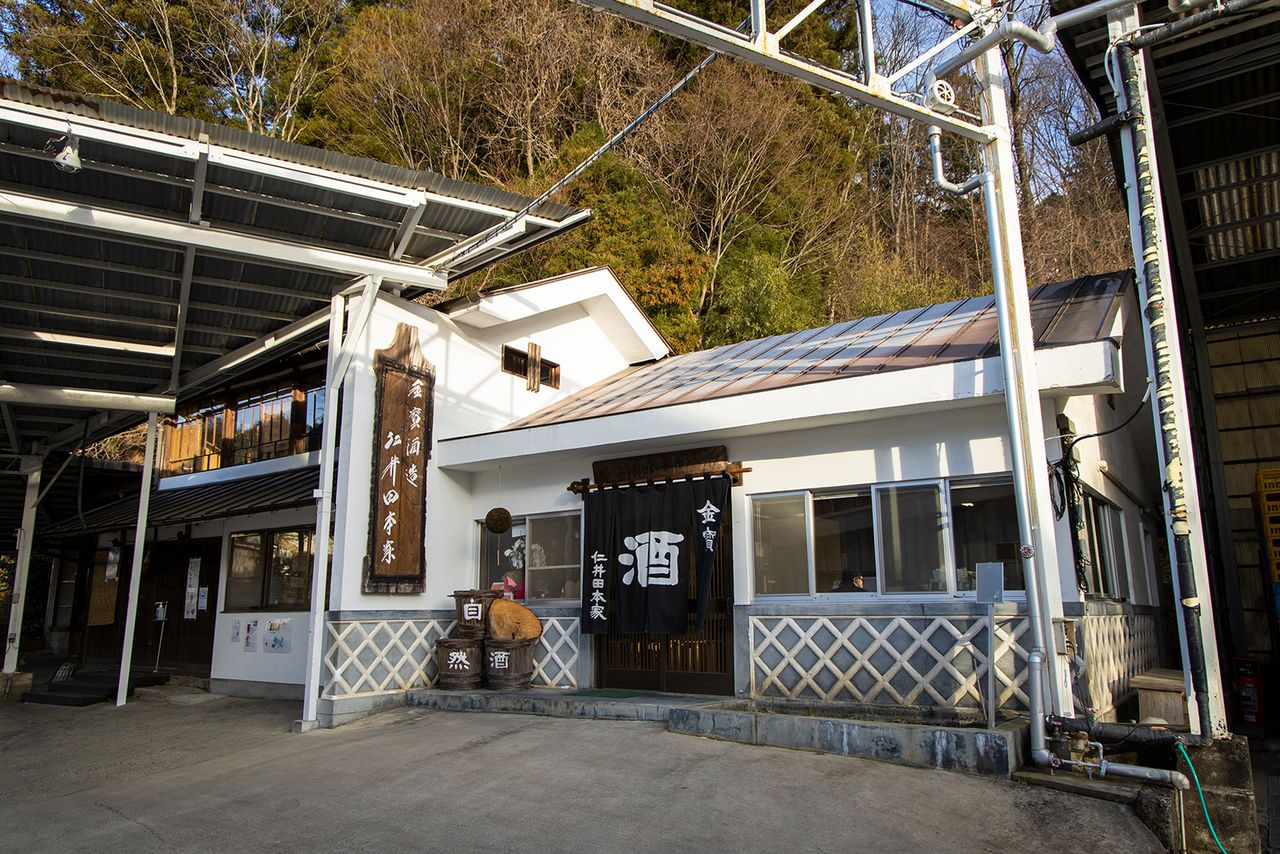
The traditional facade of the Niida Honke office and shop reflects the brewery’s long history.
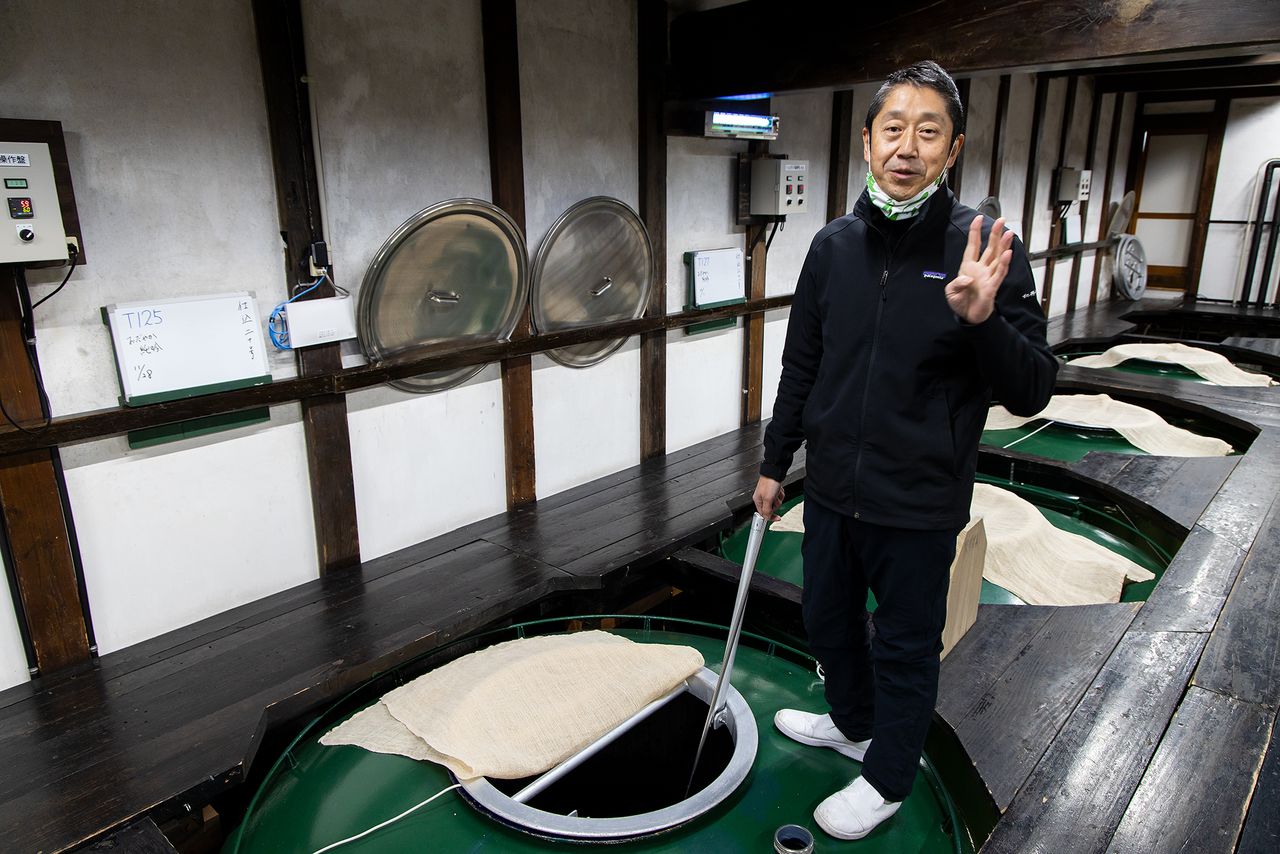
Niida Yasuhiko, eighteenth-generation head of the company and master brewer, gives a tour of the brewery.
Building on Three-Centuries of History
Niida Honke launched its Shizenshu label in 1967, when Niida’s father Yasumitsu ran the company, under the name Kinpō Shizenshu. It has remained a best seller ever since, appreciated as much for the philosophy it represents as for its deep, mellow flavor.
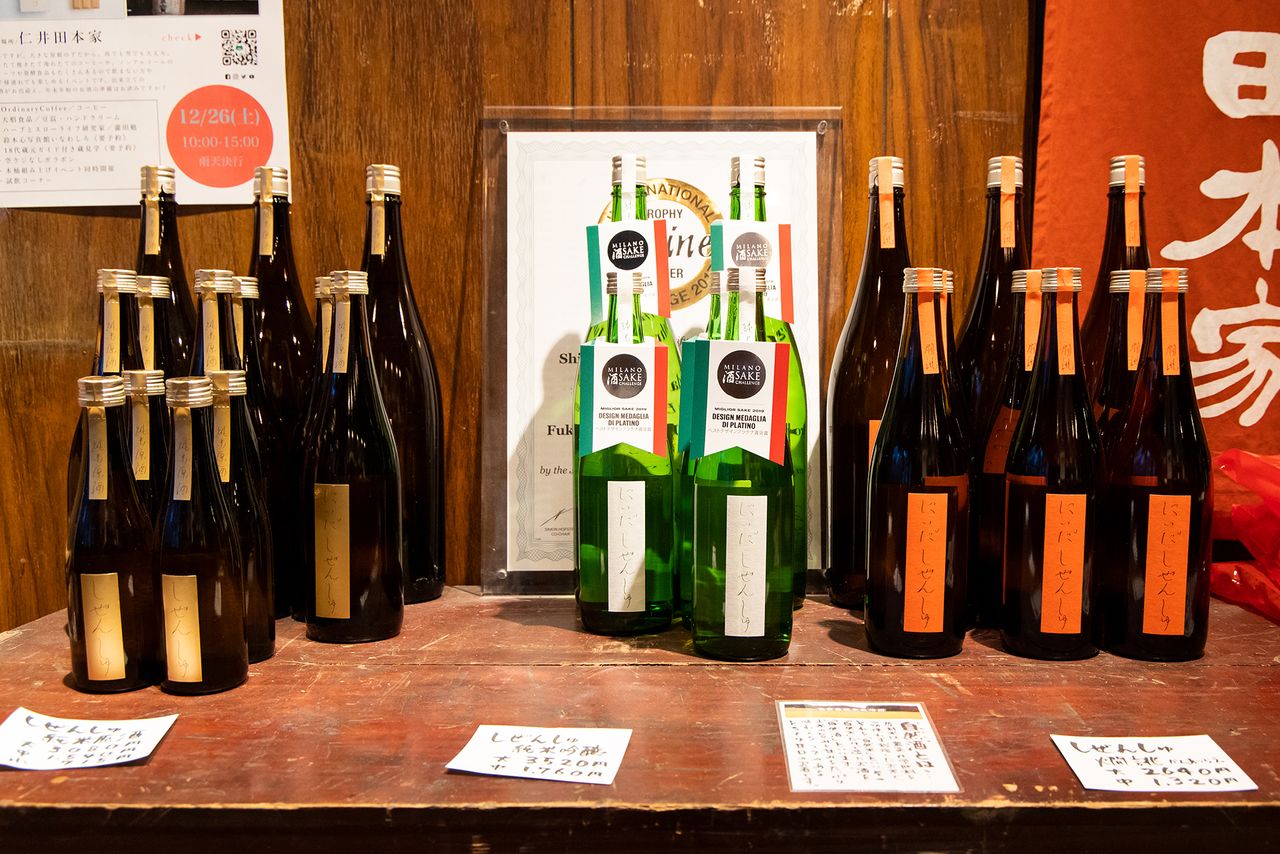
Niida Honke’s flagship brand, Shizenshu. From left to right: Junmai Genshu, the award-winning Junmai Ginjō, and Kan’atsurae.
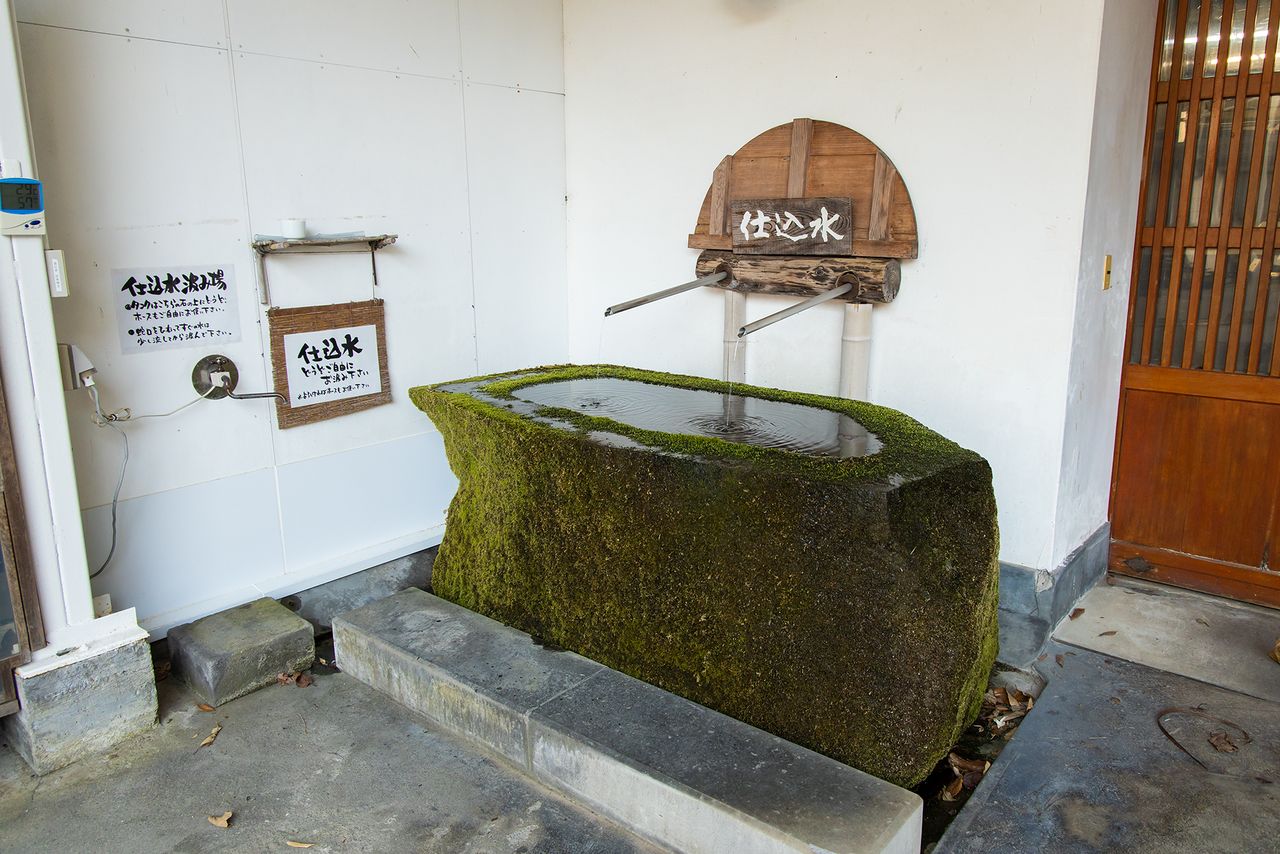
Niida Honke makes its sake using only fresh, natural water from mountain springs and a well located on the brewery’s property. Visitors can drink the fresh water used for sake making, referred to as shikomi-mizu, from a constantly replenished stone vat in front of the brewery’s sake warehouse.
“When my father established Shizenshu as our top brand, he erected a wooden sake warehouse that was built to last more than one hundred years,” Niida declares. This tradition of investing for the long term goes back generations. “My grandfather planted trees in the mountains and protected the water sources we depend on for making sake, which are equally important to the surrounding village. We’ve been able to continue brewing sake because each generation looks beyond day-to-day profits to consider the needs of the whole village as well as those of their descendants.”
Niida did not always share the gratitude he does today. In his youth, he says he did not grasp or appreciate the brewery’s long history. After apprenticing at another sake maker for a time, though, he returned to the family business with a new respect. Eager to surpass his father, he launched a new label, calling it Odayaka after a kanji character in his given name that means “calm” or “tranquil.” Like so many things at the brewery, the character too had been passed down from one family head to the next.
In 1994, Niida’s father fell ill, thrusting him into the role of family head at the young age of 28. It was a difficult time. Sake sales were plummeting and no matter how hard Yasuhiko worked, he could not seem to improve the business outlook. It did not help either to be constantly compared to his father, who had enjoyed better economic times.
In making Odayaka, Niida used conventionally cultivated rice grown with pesticides and chemical fertilizers while continuing through trial and error to create a natural sake. As the local contracted farmers aged and retired, the company began in 2003 to grow its own sake rice using organic cultivation methods. This came with risk as organically grown rice yields only half the volume of conventionally cultivated rice paddies and is more labor-intensive.
Niida points out that there are upsides as well. “You don’t have the added cost of agricultural chemicals or fertilizer,” he explains. “So long as you tend the crop properly, everything works out to be equal. By boosting our harvest, we can create the added value of a truly natural product, and we protect the environment in the area at the same time.”
Niida has continued to undertake new challenges to sustain the business “even as I struggled,” he says, looking back.
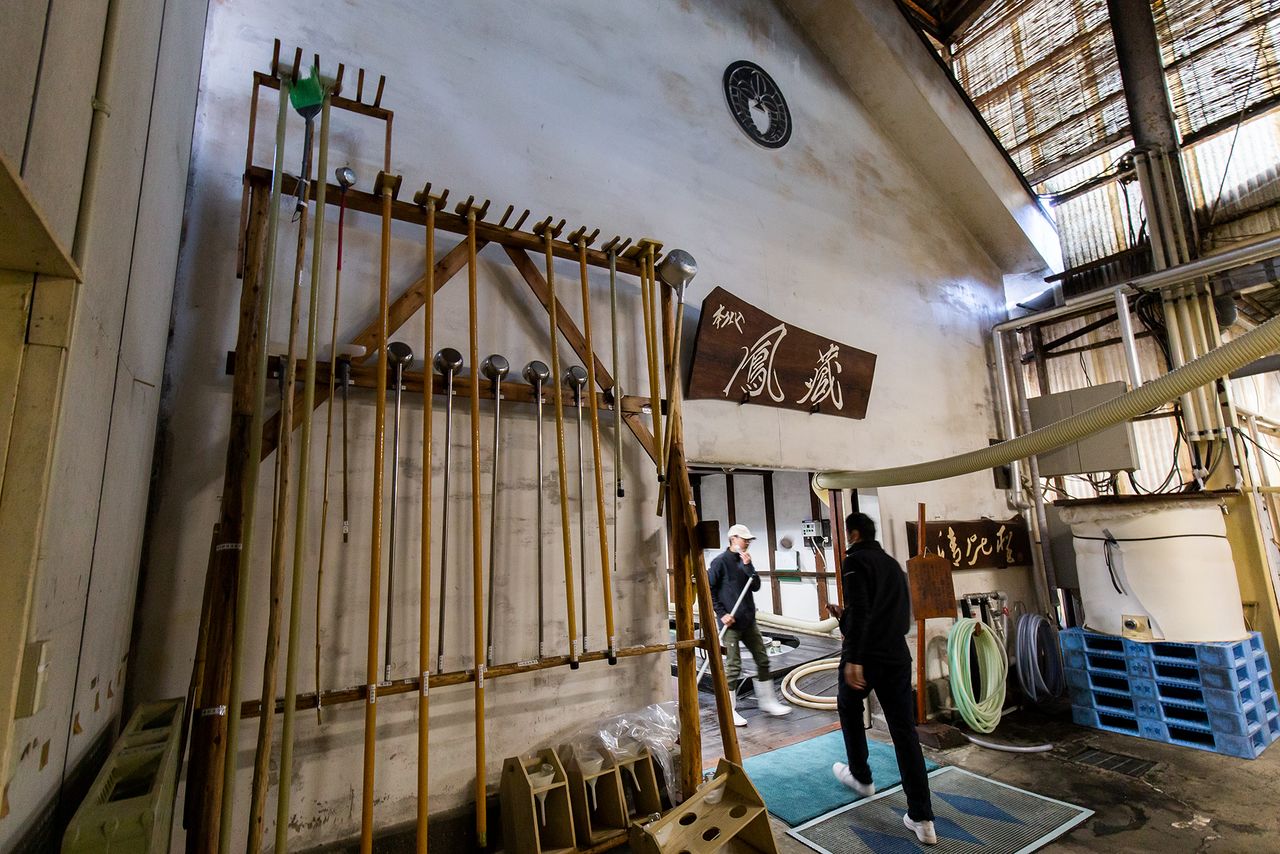
The fermentation warehouse constructed Niida’s father Yasumitsu.
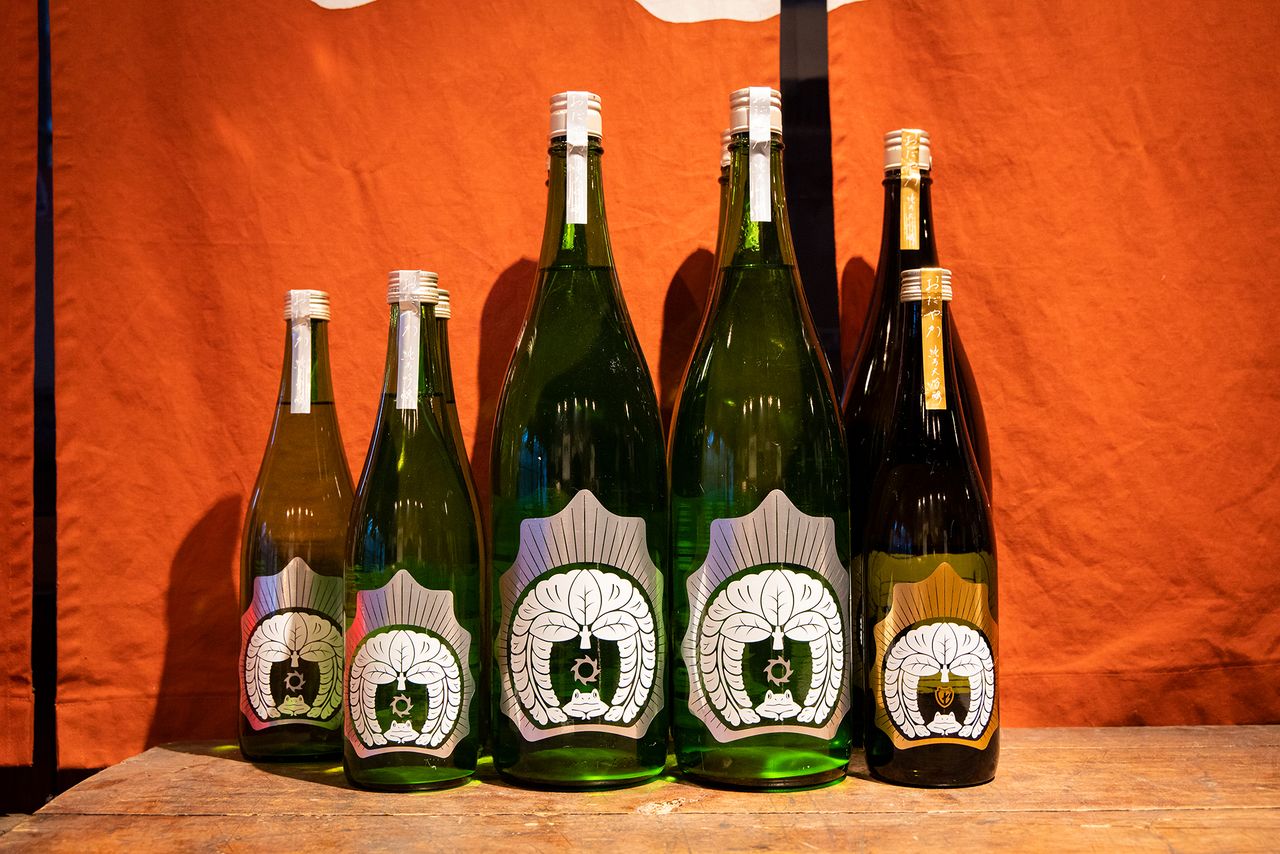
The Odayaka produced today is a natural sake made from organically grown sake rice. The brand has come to be as popular as the brewery’s Shizenshu label.
A Violent Disruption
The birth of his eldest daughter in 2009 was a turning point in Niida’s life. Now, instead of feeling burdened by the weight of having to sustain the work of the generations that came before him, or compelled by the desire to surpass his father, he wanted only to preserve and pass on the family business traditions.
Around the same time, the company’s master brewer, a veteran of the Nanbu master brewers’ guild, retired, and Niida decided to take over the job himself. Resolving to pass on not only the business, but also the skills of sake-making, in 2010 he became Niida Honke’s first owner-master brewer. This was also the year in which the brewery completed its preparations to switch over entirely to the use of sake rice grown without pesticides and chemical fertilizer. Niida completed his first fermentation process as master brewer in 2011, the brewery’s 300th anniversary, and marked the occasion by declaring the company’s commitment to an all-natural policy.
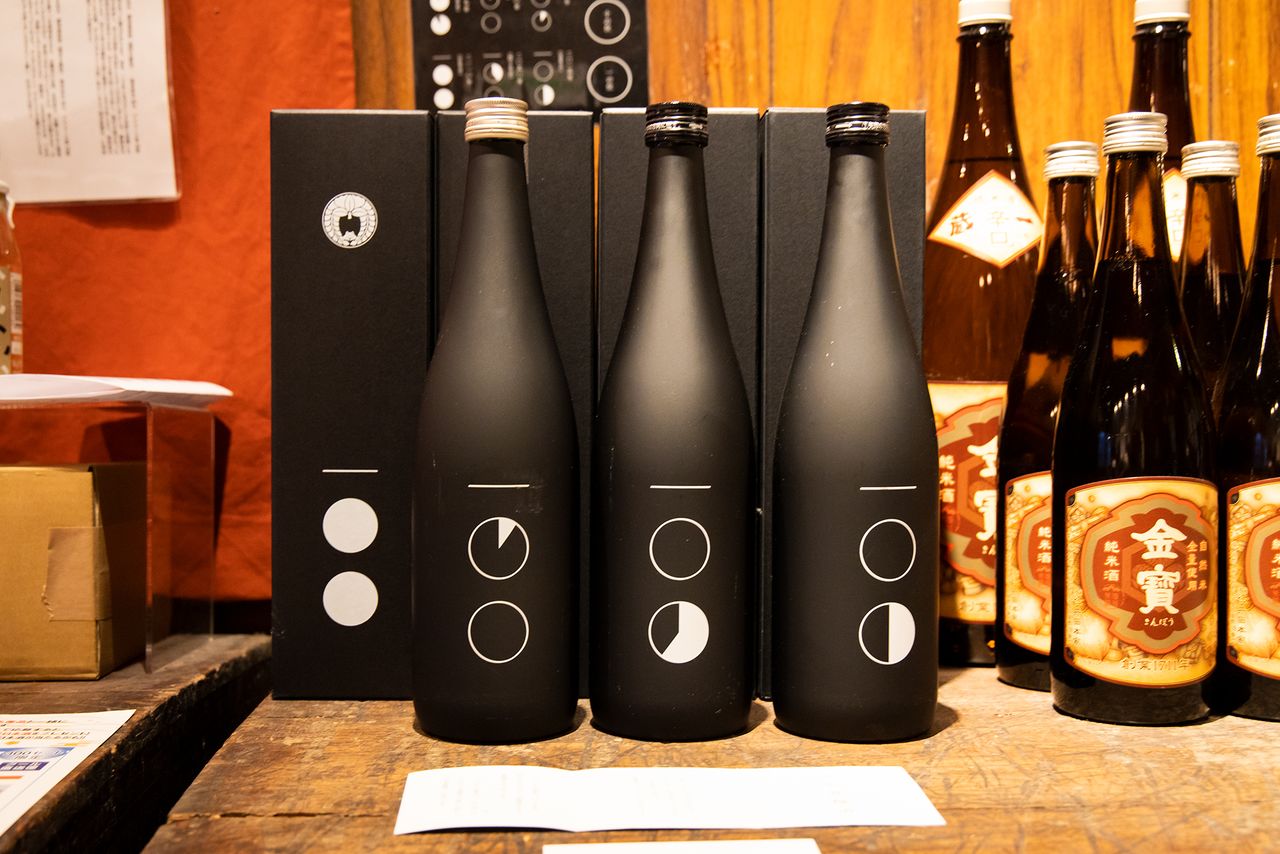
Hyakunen Kijōshu, a label launched to commemorate Niida Honke’s 300th anniversary, is fermented with sake from the preceding year.
Business was going well. But then came the Great East Japan Earthquake on March 11, 2011, followed quickly by the meltdown at the Fukushima Daiichi Nuclear Power Station. The disaster at the plant severely impacted products from the prefecture. Overnight, Fukushima took on a very negative image, far from the natural and healthy impression that the brewery was trying so hard to sell. After evacuating his pregnant wife and child to Tokyo, Niida returned to live alone in Fukushima for some time. His spirits were low as he caught himself brooding over his misfortune and lamenting the timing. “Just when things were looking up,” he told himself. After thinking long and hard of what he could do for future generations, however, he realized he needed to sustain the commitment to natural products and natural ways of doing things.
“I decided I had a mission,” states Niida. “As the eighteenth-generation head of the business, it fell to me to increase the number of organic rice paddies in the village and continue to promote the attractiveness and safety of Fukushima through our delicious natural sake.” As he saw it, by the next generation, the rice paddies would be valuable assets not only for Niida Honke, but for the entire village.
The rumors that followed the accident at Fukushima Daiichi were more harmful to the reputation of rice and vegetables grown in the prefecture than for processed products like sake. Organic farmers in the area were especially hard hit. Eager to help out, Niida contracted these farmers to grow sake rice. The expanded circle of contract farmers in Fukushima Prefecture is now an important mainstay of the brewery’s sake brewing. Says Niida with a laugh, “To be honest, until then I had been hesitant to approach local farmers, who can come across as rather gruff. I know it sounds funny, but the disaster helped us to acquire an invaluable asset in our contract farmers.”
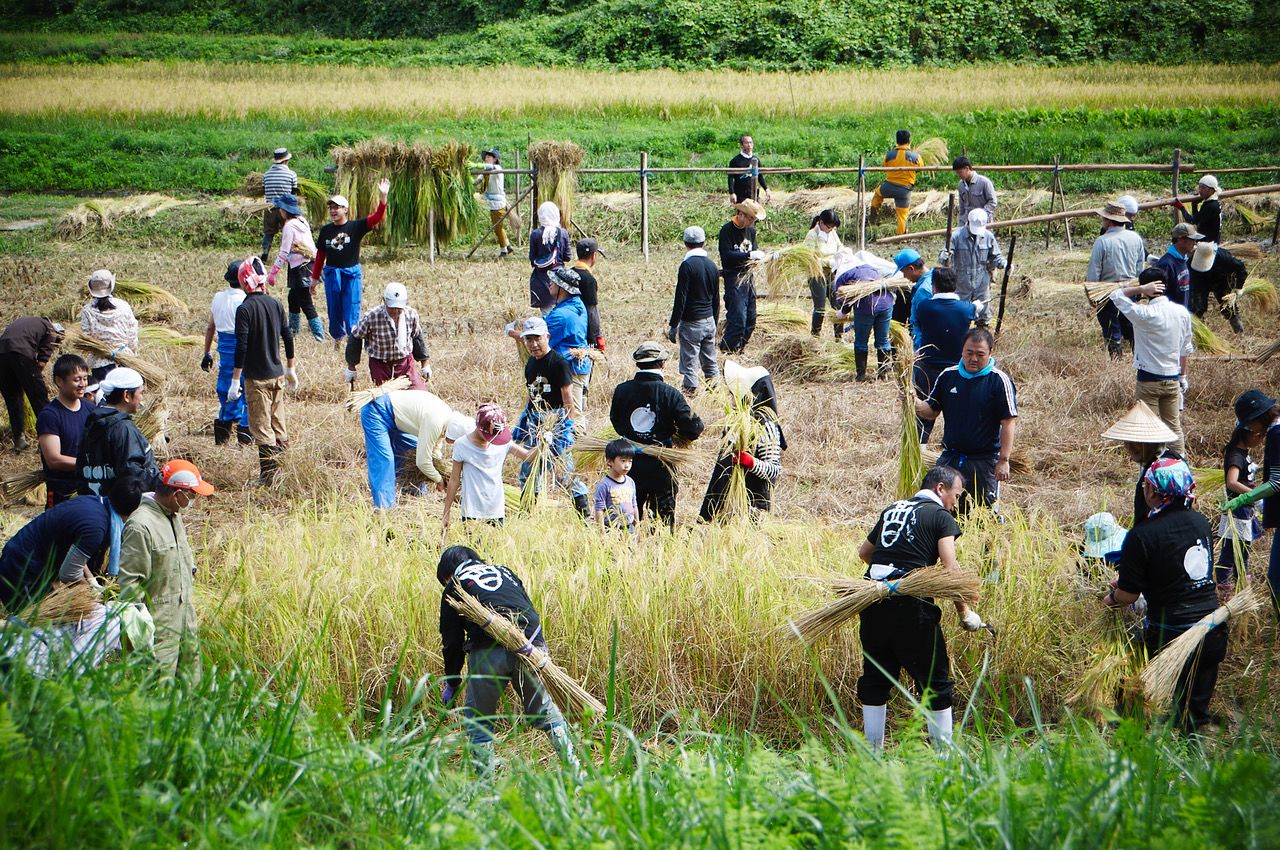
Volunteers in a harvesting event at a Niida Honke rice field. (Courtesy Niida Honke)
A Woman at the Forefront
Niida’s wife Maki played a major role in rejuvenating business after the disaster. It was at her suggestion that the brewery started making sugar-free sweets with the kōji rice yeast that is used to make sake. She was also the driving force behind a new line of non-alcoholic sweet sake.
Another of Maki’s ideas was for Niida Honke to hold events for the public to promote the safety of products from the area. Maki stresses the positive impact the gatherings have had on people’s perceptions. “You can insist all you want that everything is safe here now,” she declares, “but words don’t compare to having people come to our brewery and see for themselves how safe our region is and how carefully we make our products.” In her view, customers seeing how the sake is made and tasting the different varieties makes all the difference.
Maki has spearheaded events like the “school in paddies” in which volunteers participate in rice paddy planting and harvesting and a monthly sweets day. Activities open to children and adults who do not drink alcohol have proven especially popular, and today, events typically attract some 300 participants, including many families.
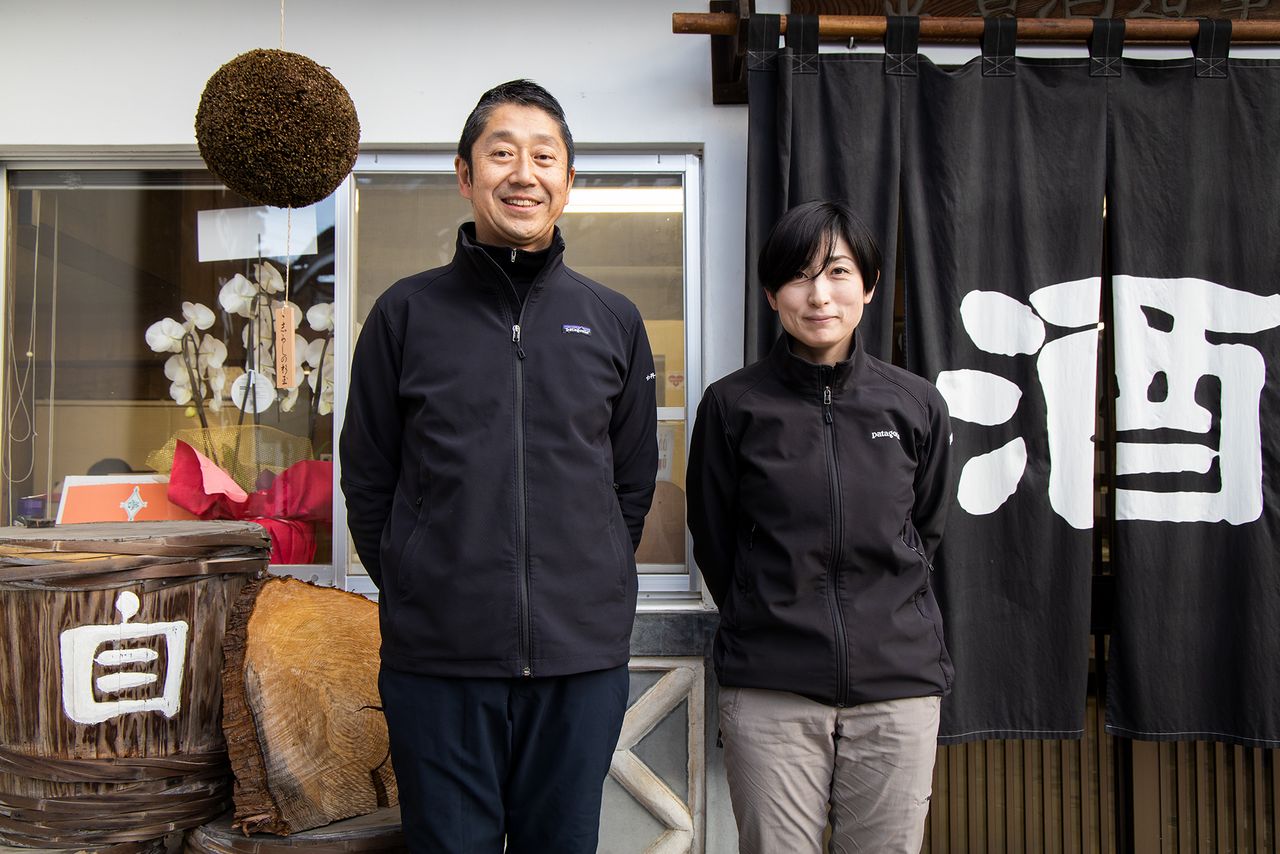
The Niidas admit that until the disaster, they never expected to see themselves at the forefront of the sake business.

Participants pose with the company president and his wife at Niida Honke’s annual “thank you festival.” (Courtesy Niida Honke)
Maki has taken charge of Niida Honke’s fermented food production, including narazuke pickles and sakeyuki, powdered sake lees. Her kōji-infused chocolates and soft caramel sweets made with condensed sweet sake have proved hugely popular, so much so that sales now give Niida Honke’s sake labels a run for their money.
Maki is vibrant and self-confident, but when the topic touches on the disaster, her eyes fill with tears, testament to the lingering scars of 3/11. Previously, she was content to remain in the background, but now she is on the frontlines of the business, promoting Niida Honke sake and sweets at fairs and events throughout the country while her husband concentrates on sake making.
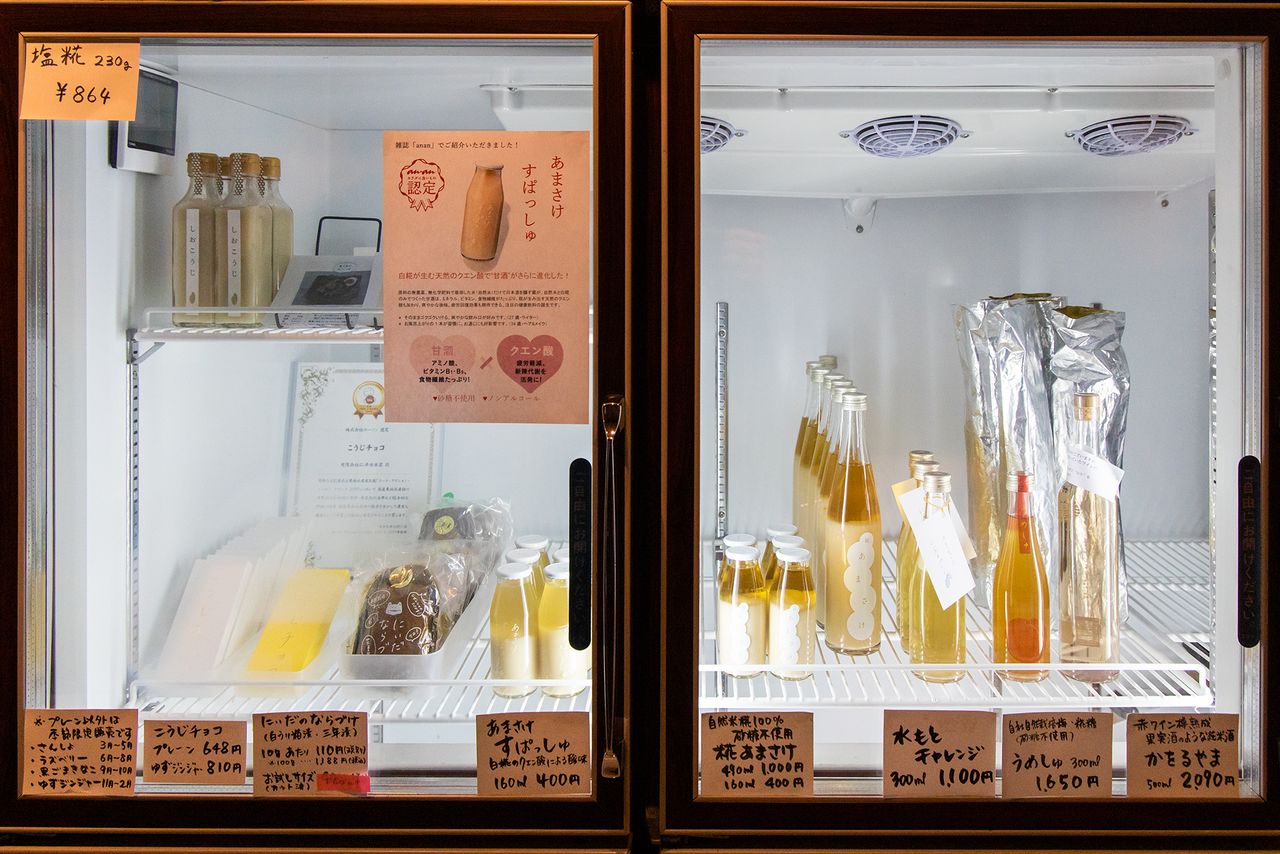
Niida Honke’s line of fermented food products include kōji chocolates (bottom right), which are available at Natural Lawson outlets throughout Japan.
Working Toward Self-Sufficient Sake Brewing
Niida hopes to convert all the rice paddies in the village—some 60 hectares—to organic farming by 2025. The brewery currently owns six hectares of the local rice paddies, which produce 10% of the sake rice it uses. If all goes to plan, Niida will soon achieve his goal of producing sake using only village-grown organic rice, local spring water, and the natural sake yeast in the brewery’s own sake kura.
He admits, however, that his self-imposed deadline may need to be revised. “The village farmers are still actively cultivating Koshihikari rice for general consumption,” he explains. “And some of the growers outside of the village who we contracted with after the disaster are now asking if they can cut back on sake rice production to grow more table-rice varieties.” He takes these requests as a sign that Fukushima Prefecture is recovering, a development that he happily welcomes.
The local farming population continues to grey, though, and Niida says he must be ready to take over when growers are no longer able to tend their fields. “As a company, we must ensure that we have the finances and other resources to do the job right and that we are sufficiently knowledgeable about rice cultivation.” He adds that even if he is unable to accomplish his goal in his lifetime, it will be enough if it eventually gets done, no matter how long that might be.
Niida says his daughter is interested in the business and is quite willing to succeed him as head of the brewery. His only concern is that her name does not contain the traditional character odayaka. “Well, she’ll just have to marry someone with the character in his name,” he laughs, proud that he will have such a dependable successor.
Since late 2020, Niida Honke has crafted sake barrels from cedar harvested on its own forestland. The natural yeast infusing the wooden barrels will foster even richer flavored varieties of sake in the future, and Niida looks forward to the day he can drink these new creations.
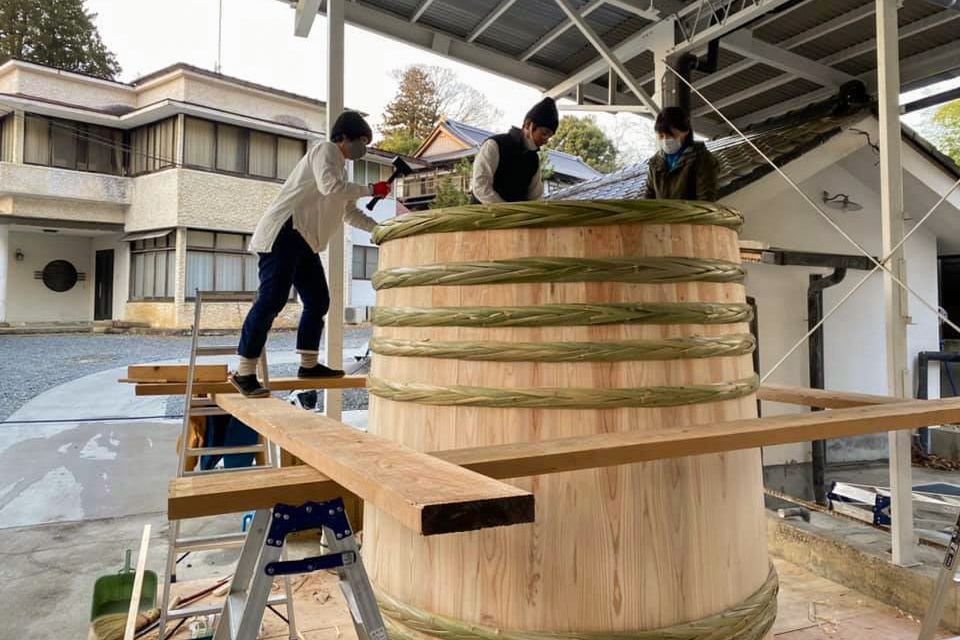
With the number of sake barrel craftsmen in Japan dwindling, Niida Honke has taken to building its own barrels. (Courtesy Niida Honke)
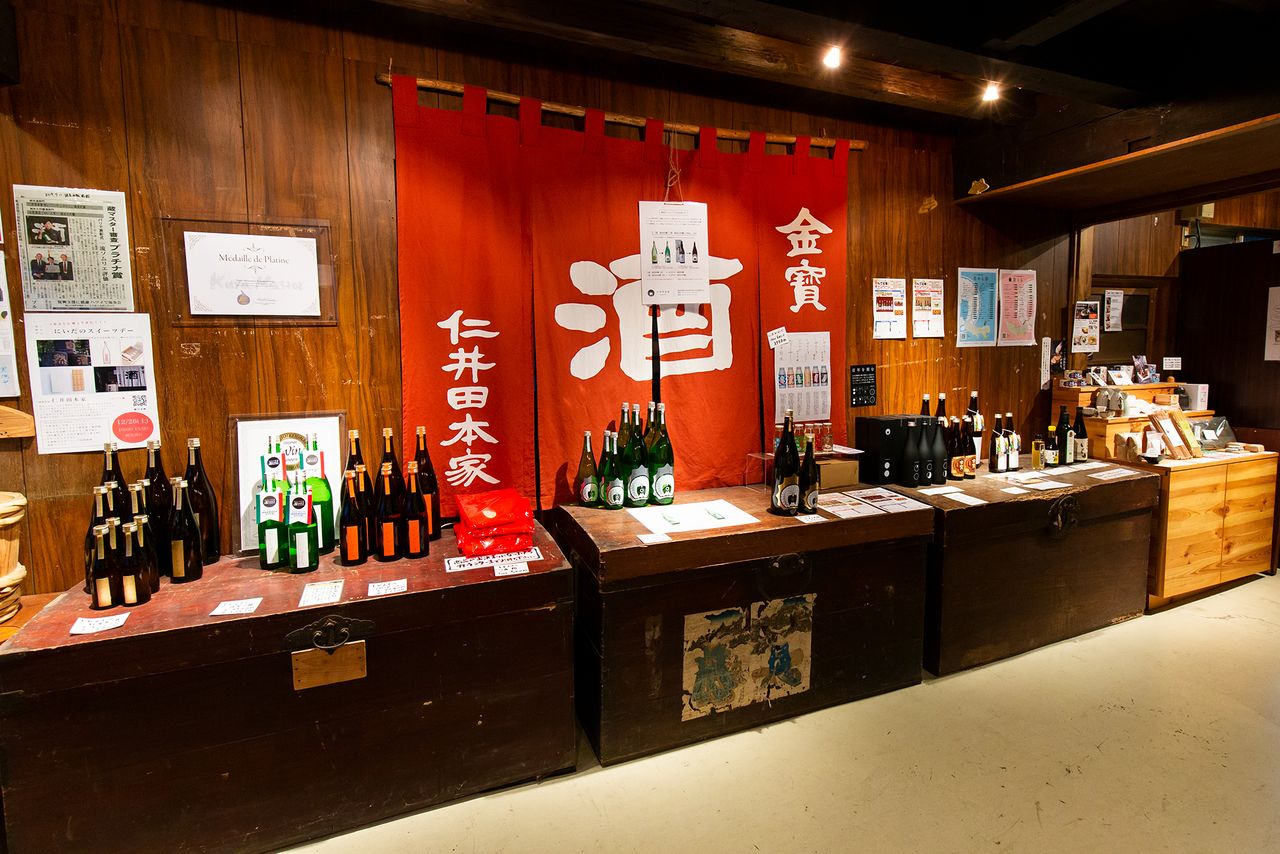
Visitors can sample the various sake Niida Honke brews at the company’s shop.
Niida Honke
- Address: 139 Takayashiki, Kanezawa, Tamuramachi, Kōriyama, Fukushima Prefecture
- Hours: 10:00 am to 5:00 pm (Closed for summer and yearend/new year holidays)
- Access: About 20-minute drive from JR Kōriyama Station or Kōriyama Higashi interchange
Follow me on Instagram @allaboutsake
Publish : June 18, 2021
Categories : Sake News
Content Source : Nippon.com
Source post link : Fukushima’s Niida Honke


